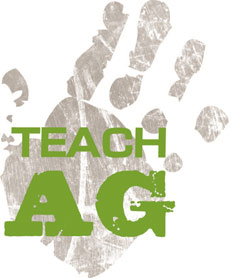Why Teach Agriculture?
Ag teachers never have the same day twice. One day they might be in a classroom or laboratory, the next visiting students in the field, preparing teams for a FFA Career Development Event, or leading a community service activity with their FFA Chapter.
Ag teachers...
- Teach by doing, not just telling
- Share their passion for agriculture
- Create lessons that are hands-on
- Reach students, including those who might not be successful in a traditional classroom
- Teach about cutting edge topics, like cloning, satellite mapping, biofuels, alternative energy and more.
- Travel in state, nationally, and even internationally.
- Work with new and emerging technology from agribusiness companies.
- Agricultural educators are often on extended contracts, which means they get paid during the summer months and have the potential to earn a significantly higher salary than other teachers.
|
|
 |
Visit the NAAE website to see FAQs about a career in Agricultural Education. (The information above is used with NAAE permission.)
|
How Do I Become an Ag Teacher?
Wisconsin’s Department of Public Instruction (DPI) is the agency that regulates teacher licenses. Check their website for official licensing information, including the various pathways to licensure.
There are three pathways that pertain to most of the current Wisconsin ag teachers:
-
The traditional route is to get a higher education degree (Bachelors or Master’s) with teaching licensure. Within our state, UW-Platteville and UW-River Falls both offer this as a Bachelor program. Additionally, UW-River Falls offers it as a Master’s program. There are also several out-of-state programs and a limited amount of online options. More details can be found at https://www.naae.org/teachag/college.cfm.
- Becoming a larger demographic are ag teachers who utilize the Experience-based Technical and Vocational Education Subjects Pathway. This is based on a point system in which the individual demonstrates a certain amount of content area and teaching experience, coupled with a hiring district that is willing to establish and oversee a multi-year, on-the-job training to round out the candidate’s licensing experience.
- Wisconsin allows an emergency license in which an individual can teach while they are obtaining their higher education degree with teaching licensure.
|